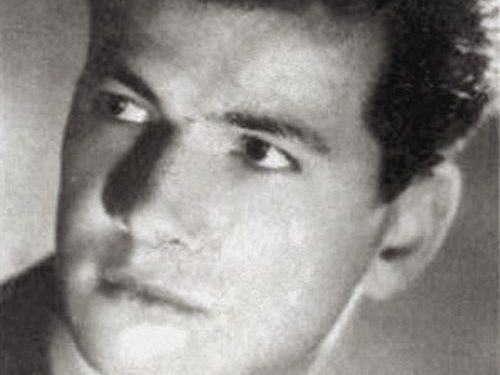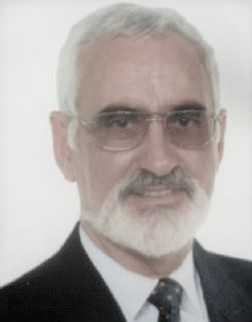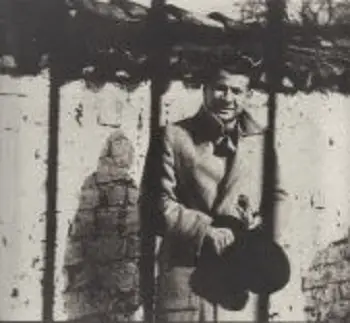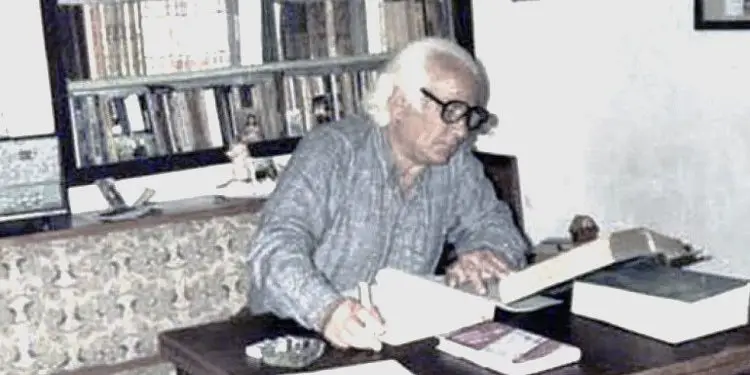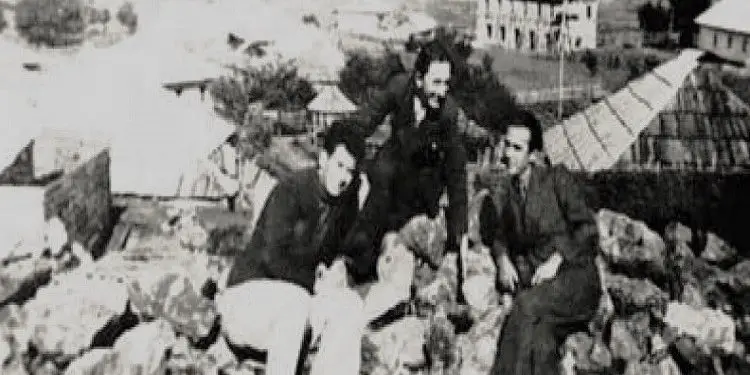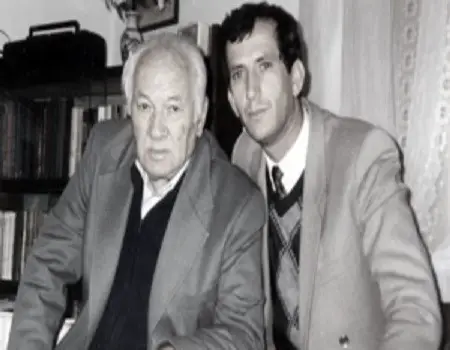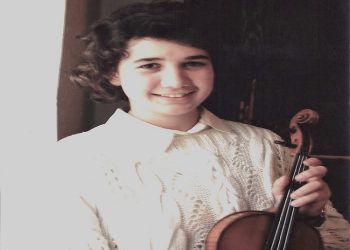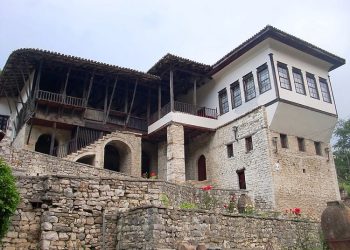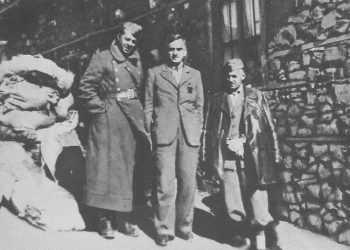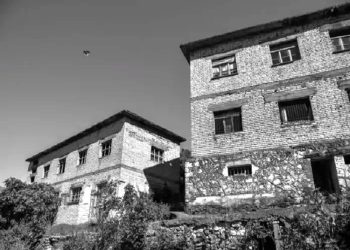By Thanas L. Gjika
Memorie.al / In the scientific hall of the National Library in 1992 – ’93, a new face caught my eye. He was a large man, with a head as if carved in oak. He had the features of a man with a strong character, which inspired respect. He sat at the table in the left corner, in the last row, so when you entered the hall, you could see him if you turned your head to the left. He read and wrote with a concentration that was noticeable. Although he had the entire hall in front of him, he did not raise his head to see who was working, who was entering and leaving, nor to draw the attention of those who stopped and talked while standing, during the entrances and exits. He did not approach anyone. I never saw him drink coffee with anyone. It was clear that he had many thoughts and works to put on paper…!
One day, when I was leaving the hall to take a break with my friend, Iliaz Gogaj, I suggested that we invite the man on the corner for coffee, but Iliaz motioned to me that we could meet him another time. Then, during the conversation while we were drinking coffee, he explained to me that the man on the corner was called Lazër Radi, a former political prisoner who had spent many years in prisons and internments. He knew several languages, had graduated in Italy, in Jurisprudence.
After my departure to the USA, in 1996, I was disconnected from the Tirana press for several years and was unable to read any of Lazër Radi’s writings. Years later, when Lazër had passed away, I met a friend of his through the Internet, the former persecuted Lek Pervizi, the painter and rhapsodist of the prisons during the dictatorship, who published the magazine “Kuq e Zi” in Brussels. He suggested that I also publish my writings in the sister magazine Radiandradi. com, which was published in Italy by Jozef Radi, Lazr’s son. In this notebook, I read articles and excerpts from Lazr’s works, as well as the chronological study in two parts; “The Whole Life as a Film”, presented in this magazine by Jozef on the occasion of the 100th anniversary of his father’s birth (January 29, 1916 – January 29, 2016), where I got to know the main feats of Lazr Radi, accompanied by many photographs and illustrative covers.
Today, I regret that I learned about the life and work of this great Prizren resident after his death. His persistent struggle to be educated and to gain culture and knowledge, his victory over the persecutions inflicted on him by the communist dictatorship, his patriotic and democratic passion for writing articles and works, along with the creation and joy of a healthy family in inhumane conditions, are inspiring for every honest Albanian.
I wrote this article because I feel it is my duty to apologize to this true intellectual and democrat, this persecuted creator, for not getting to know him closely, in the years 1992-1995, when I could have benefited from direct conversations with him…?!
* * *
Prizren, December 24, 1924
On December 24, 1924, around midnight, mother Gonxha woke up her three sons; Antonin, Balto and Lazri and her daughter Gjyliana. After they all dressed in their best clothes, they went out of the house. With their father in front, they headed towards the Great Church in the center of Prizren. There the birth of Christ would be celebrated. The snow had covered every corner over a meter. The road in the middle of the snow looked like a deep ditch, like a war trench, shoes creaked crunching, trampling the floury whiteness. Baca Prend was holding the youngest, Lazri, almost 9 years old, in his arms, which he was taking to such a ceremony, for the first time…!
For several days, numerous Serbian soldiers with bayonets raised high had been walking here and there, especially towards the border with Albania. They went to overthrow the Fan Noli government there, to then subdue the Azem and Shote Galica platoon in Kosovo. With their fighting, they had turned Drenica into an area beyond control. Drenica was called Little Albania. Catholic believers were walking towards the church from many directions, in family groups. The ringing of bells helped their walk. Inside the church, peace reigned. The lights of the candelabras and candles gave the environment a glow that a child had never seen in that church, during the Sunday morning mass ceremonies. Songs about Jesus and the Holy Mary sounded sweet. All believers felt the presence of the Lord Christ in the air of the Cathedral. A great comfort, an optimism and security was felt in the hearts of everyone, especially the children. Their eyes shone with a stronger light than in the lessons.
Lazri would remember the emotions of that night throughout his life. Those songs, those lit candles and candelabras, those sweet songs and psalms, that divine spirit that possessed the hall filled him with feelings of kindness and love. The memory of the emotions of that night would help him in the future to become more kind, more loving with his family, friends and anyone he would know. The moral and spiritual impact of that ceremony would perhaps be as great as the impact of all the lessons he would take during his education and the reading of hundreds of books that he would absorb during his future life. From his pure soul, the prayer was born that night: “I thank you, O God, for being born a Catholic and for illuminating my path with the teachings of Jesus Christ”! – A prayer that he would repeat later, whenever he found himself in happy or difficult situations. In 1929, like many other Albanian families in Kosovo, Prend Radi’s family moved and settled in Albania, in the city of Durrës. At the end of October, Lazri was enrolled in school in the third grade. Until then, his education had been completed in Prizren, in Serbian. He had learned a little reading and writing in Albanian, in the Albanian church.
The next school year he went to Tirana and continued his studies, while in the years 1931-38, he attended classes at the State Gymnasium in Shkodër, where for several years; he lived in the “Malet Tona” dormitory. There he was fortunate to be a student of several patriotic and dedicated intellectual teachers, such as; Ernest Koliqi, Eqrem Çabej, Skënder Luarasi, Simon Rrota, Paul Guzhoni, Filip Llupi, Kolë Kamsi, etc. dedicated intellectuals, who influenced his formation. He tried to be among the most distinguished students. He began to write in the press of the time with the initials L.R., or with the pseudonyms “Lara”, “Lapredi”, “Ladi”, etc.
In 1936, his sister Gjuliana served as a teacher together with Migjen, at the school in Puka. Due to the harsh winter, the school in that town was a summer school. Gjyliana invited her brother in the summer of that year to go to Puka and get to know the poet. After going and living in the premises of that school during the months of June-August, he got to know his beloved poet closely, experiencing important moments from his creative process. He would write many articles about these in the future, as well as the book of memories, “A Summer with Migjen”.
In Shkodra, the high school student Radi in the years 1934-37, made friends with Arshi Pipa, Kolë Ashta, Pashko Gjeçi, Qemal Draçini, Gaspër Palin, as well as Qemal Stafa, Vasil Llazar, Xhemal Broja, Elez Braha, etc., who, under the influence of Zef Mala, began to participate in the communist movement of that city. As a connoisseur of Serbian, he was tasked with translating into Albanian the propaganda brochures that came from the Yugoslav Communist Party, the branch of Montenegro. The boy liked the revolutionary spirit, the idea of liberation, brotherhood and equality between peoples, the preservation of the group’s conspiracy, several actions to help the citizens of Shkodra from the floods of Kiri, etc. But as a Prizren resident, he noticed that the Montenegrin agitators spoke with great passion about the need for sabotage, about the political assassinations that the members of the Shkodra communist group were supposed to carry out, and above all, he found the verses of the Serbian song: “O Tsar Lazar, the golden crown of Serbia…”, which the Montenegrin communists sang to him in Serbian, to praise his work, when he translated their pamphlets or speeches. Born and raised in Kosovo, he had experienced firsthand the atrocities of the royal army of the Serbo-Croatian-Slovenian state against the Albanian people there.
The song of these communists about King Lazarus and the sparkle in their eyes when they spoke about the need for sabotage and assassinations that the Albanian communists had to carry out, sparked in his mind the idea that was not said openly: “The Serbian and Montenegrin communists, behind the propaganda for the liberation of the peoples from oppression, behind proletarian internationalism, hid the ancient goals of expansion”. He had the courage and told his comrades openly at the meeting that he felt like a stranger in that group and left, without harming anyone and preserving the conspiracy of the cells. His childhood experience helped him to break away from the Shkodra Communist Group.
In Rome at St. Peter’s Cathedral
In 1938, after finishing high school, Lazri was able to obtain, not from the Albanian state nor from the King, but through his own efforts, a half-scholarship to pursue his studies in Jurisprudence at the famous University; ‘La Sapienza’ of Rome. After the joy of moving from Kosovo to Albania, this was the second move even more joyful than the first. Visits to the magnificent city of Rome, where on almost every street he contemplated various monuments from Antiquity, the Middle Ages, or the Renaissance, visits to the city zoo, frequenting the Opera Palace, where he met other young Albanians, filled the young Lazri with joy, but also with a sadness, for the halved and divided Albania, for the poor and destroyed Albania, where the Ottoman invaders had left no ancient or medieval monument standing and, worst of all, had left a Turkish mentality.
In Rome, in addition to numerous friendships, he approached and became friends with several beautiful Italian girls such as; Lili Bandini, Claudia Carnavali, etc. He increased his relationship with one of them, with Miss Lidia Barberini, and in 1941, Lazri became a father for the first time, with his son Alfredo. In August 1941, another joyful event occurred: Germany, after defeating the Serbo-Croatian-Slovenian state, divided it into several independent states, while the southern part of Serbia was divided between Bulgaria and Albania. Albania was annexed to a territory of almost 12,000 square km, with a population of over 820,000 inhabitants. Many Albanians, although their homeland was occupied by the Italian fascist army, began to feel optimistic about the future. They reasoned that their homeland, now including most of Kosovo, some Albanian parts of Montenegro and Struga, Kicevo, Tetovo, Gostivar and Dibra, could achieve its liberation from the Italian occupier in the near future.
The Vlora War of 1920 was a concrete example that inspired this dream of the possibility of future freedom. In such a situation, the student Lazër Radi could not help but rejoice! The dream of national unification had come true, which the Albanian people could not realize on their own. The massacres of the Albanian population by the bloody Serbian invaders had stopped. He flew with joy when he learned that his former teacher, Ernest Koliqi, in his capacity as Minister of Education, decided to open Albanian schools in the united territories, where the Serbian invaders had not allowed the Albanian people to open schools in their native language. He was ready to go and become a teacher himself in his beloved Prizren, but he soon learned that the Albanian government had sent many teachers all over the united territories, so he continued his studies calmly…!
Young Albanians who were in Rome to perform military service or for studies had made it a habit that on Easter Sunday, which was celebrated in the spring, when the resurrection of Jesus Christ was celebrated, and on the evening of December 24, when the birth of Jesus Christ was celebrated (Christmas), they would go to the magnificent Cathedral of St. Peter. These Albanians had never experienced more beautiful celebrations than these, in such pleasant and magnificent surroundings. Although most of them were from Muslim and Orthodox families, they went to the Cathedral more out of curiosity and respect for the Italian government, which was treating the Albanians even better, after the defeat it suffered in the Italo-Greek war, in October-November 1940.
Inside the large hall of the Cathedral, which was packed to the brim, only the singing of the choir could be heard. The lamps and candles were countless. At the end, everyone performed their prayer in silence. Lazri muttered to himself: “Thank you, God, for the honor of uniting the Albanian people. I beg you, God, help me finish school as well as possible and go to Albania to help the Albanians”!
In post-war Tirana, December 24, 1944 and December 24, 1953
After graduating with a ‘Doctor Juris’, Lazri was offered a job at La Sapienza University, as an assistant to Professor Vidar Casarini – Sforza, in the Department of Philosophy and Law, but he decided to return to his homeland, to serve his people. In the summer of 1942, Lazri settled with his family in Durrës. There he began working as an intern, in the office of Attorney Golgothas. The desire to help in the emancipation of Albanian society, pushed him to resume cooperation with the Albanian press of the time, with the early pseudonyms and the new pseudonyms “Ushtima e Sharrit” and “Gjergj Komneni”.
In December 1942, he began collaborating with Dr. Gulielm Deda, for the publication of the newspaper “Balli i Rinisë”, organ of the group Albanian Fascist University Youth Union (BRUFSh). In the summer of 1943, after divorcing his Italian wife, Lazri brought his 3-year-old son, Alfred, to Albania. On October 21, 1943, he married Miss Vitore Vushmaqi, originally from Vermoshi, who lived in Tirana. She attended the “Nana Mbretneshë” high school. In early May 1944, he received the title of lawyer, while working as director of the Housing Office in Tirana. At this time, he also collaborated in the regulation of several Albanian codes and laws. In the summer of 1944, his family was joined by a daughter, Veronika.
After the partisan forces liberated Tirana, before the German army had even left, the leadership of the partisan forces began a process of arrests in the capital of those who were thought to be opponents of the Albanian Communist Party, even though they had no activity against this party. Among them, on November 23, 1944, Lazër Radi was invited by some armed partisans, “for a job in command…”!, just as Bahri Omari, Xhevat Korça, Kol Tromara, Mahmud Përmeti and 60 other intellectuals and nationalists were also invited. These, after being gathered in command, were not released. From March 1 to April 13, 1945, a Special Trial was organized for their sentencing, with President Koçi Xoxen and prosecutor Bedri Spahiu, as well as several former partisan judges, most of whom were uneducated. Without concrete evidence of any hostile or criminal activity, some were sentenced to death, some to life imprisonment, and some like Lazri to severe imprisonment: 30 years, while others, to 25 years in prison and some to less…!
To create the idea that the Communist Party respected human rights, on December 24, 1944, Dom Shtjefën Kurti was sent to the new Tirana Prison to perform the Christmas mass. The prisoners gathered all together in the dining hall: Catholics, Orthodox and Muslims. The prison command wanted the Muslim prisoners to refuse, while the Orthodox Christians to ask for their priest, or there would be noise and chaos, due to the lack of knowledge of the Catholic rite. In a word, the command wanted the mass not to be held, or to fail, turning into a comic farce. However, the prisoners, despite their different religious beliefs, showed solidarity. Their solidarity stemmed from the hatred they felt towards the new communist regime, which had wickedly gathered them together, supposedly for a job in command, and was holding them to punish them without any guilt.
Despite the few candles and the lack of a choir, the seriousness with which Dom Shtjefni organized the ceremony, the silence of those present, the song Glory to God in the highest! Peace on earth to men of good will, which began to be sung by a few voices and then strengthened by the participation of the majority, gave the atmosphere a spirit of sanctification. The hearts of those present were filled with love for one another. Tears of joy flowed down their chins and dripped onto the floor. When the mass was over and the prisoners left, tear stains could be seen on the floor. Dom Shtjefën Kurti, a few years later, was imprisoned and executed by the communist dictatorship, but the Christmas mass was never repeated by him because it was forbidden and Dom Kurti was closely guarded. During a break, in privacy, he said to Lazri: “Brother Lazri, I have never celebrated a more emotional and pious mass than the mass of December 24, 1944”.
Lazri approached him and in a low voice, told him that since that night, when he goes to bed, he addresses God with a prayer: “I thank you for the honor, O God, that even in prison, you are with us, humbly and comforting us. I beg you, O God, protect our people from the temptations of the devil! I beg you, O God, soften the hearts of the communists”!
Dom Shtjefën sighed: “These communist hearts are already becoming wild. May God help us”! Years later, on December 24, 1953, when Lazri was working in the prison camp for the construction of the Rinas airport, he had the opportunity to participate in the mass that the prisoner Father Pjetër Mëshkalla organized in secret, in the food silo. Although it was organized in secret and with great reverence, the convicts were filled during that mass, as well as with comfort, sanctification and hope. Lazri repeated his prayer: “I thank you for the honor, O God, that even in prison you are with us, humbling and comforting us. I pray, O God, protect our people from the temptations of the devil! I pray, O God, soften the hearts of the communists”!
Faith in God and with it the hope for the fall of that regime did not die. Indeed, many prisoners died during torture in the investigation cells, in the prisons of Burrel, Spaç, etc.; in the labor camps in Tepelena, Maliq, Vloçisht, Turan, etc., or in internment villages. However, the persecution of conscience never ended, because they were aware that one day the communist dictatorship would capitulate just like the fascist and Nazi dictatorships. In fact, the persecution of conscience did not end, but increased and emerged victorious over the communist dictatorship.
Just like the descendants of Gjon Marka Gjon, Abas Kupi, Mustafa Merlika Kruja, Preng Perviz, etc., the family of Lazër Radi did not die out during the communist persecution. When Lazri was released from prison in 1954, his wife had been imprisoned and his daughter, Veronika, had died, while his son, Alfredo, had been taken to be raised by his older brother. He was interned in the village of Kuç, and later in other camps, such as; Gradishte, Çermë and, Savër in Lushnje. On March 12, 1956, his wife was released and they lived together in exile, where they resumed their family life full of deprivation, but with a blessing from God.
Before going to join Lazri, Vitorja visited the Holy Place of Saint Ndoi in Laç i Kurbinit. The ancient church had collapsed and turned into ruins, but the people’s faith in the miracles that the saint could perform had not faded. Vitor climbed the hill, walking on her knees and praying to God and Saint Anthony, that after her union with Lazri, they would grant her a son so that the Radi family would not die out.
God and Saint Ndoi, heard the prayer that this humble woman addressed to them with all her heart. They fulfilled her request, as they know, with more than the devout believer asks for…!
The capitulation of the communist dictatorship found Lazër and Vitore Radi with a renewed family, with two sons and a daughter married and with children, that is, with a blessed and expanded family. The Radi family returned to Tirana, with two sons, Jozef and Luçian and daughter Adriana, as well as seven grandchildren. All of them handsome, good-natured and moral. Mother Vitorja very soon went to the ruins of Saint Ndoi, where she donated some items and said a prayer of thanksgiving, for the blessing that God and Saint Ndoi gave her…!
Lazër Radi’s blessing was two-pronged: on the one hand, the family as a full hive and on the other, abundant literary and scholarly creativity. This admirer and follower of Migjen, writes in a sweet, eloquent style, like Migjen himself, with short sentences, with a rich language full of literary figures, always clear and unequivocal. He completed and published his works written during the years of exile in Tirana, in the years 1993-1998, when he also wrote many new articles and works.
Officially, as for most creators who are among the former persecuted of conscience, no significant interest or appreciation has been shown. But some intellectuals, his friends and his family, in October 1996, held a scientific symposium at the National Historical Museum, where his intellectual, scientific and moral values of a man who was not defeated by the communist dictatorship were highlighted. For him as a writer, prominent and talented people have also given assessments, such as the poet Visar Zhiti, etc. The scholar Robert Elsie, in his dignified work; “History of Albanian Literature” (Publishing House ‘DUKAGJINI’ 1997, p. 414-415), is the first to give an assessment of his life and work.
The Albanian governments of the transition did not create living conditions for either Lazër Radi or his descendants, which is why they are now scattered around the world, because Ramiz Alia and his clan worked to ensure that Albania and its wealth were inherited by the sons and descendants of the communist dome, according to the “Katovica” plan formulated before the capitulation of the communist dictatorship was announced. Today, the eldest son Alfredi (from his first marriage) and the other two sons, Jozef and Luçiani, live in Italy with their entire families, while the daughter Adriana lives in the USA, with her husband and daughters.
Jozef resembles his father in terms of talent and patriotic, political and social commitment. He has been publishing the online magazine “Radiandradi” in Italy for five years. There, in addition to the writings of his collaborators, he also publishes his father’s and his own creations. Jozef’s life and creativity deserve an analytical article, which we can do later. This year, he managed to collect all of his father’s writings in a corpus of 17 volumes, of which these weeks, he managed to publish two volumes; “The Mist of a Distant Time” -I- “Prizren and the Iron Minister – Mirash Ivanaj”. These two volumes by Lazër Radi were presented at the book fair in Prizren, where the intellectuals of that city welcomed the return of their fellow citizen with love and warm appreciation.
For her part, the daughter Adriana resembles her mother in terms of family and religious devotion. Just like Alfred, Luciani and Jozef, Adriana also helped and is helping financially for the preparation and publication of the corpus of works of their talented father. The life and work of Lazër Radi will be studied and appreciated as it deserves, after the Vetting and the Reform in Justice are realized, when our society has expelled the pseudo-democratic and pseudo-socialist rulers from power. In his life and work, Albanians will find the man of resistance, the great devotee to the national and social issue, the patriot, who dedicated all his energy and knowledge to the fight for the emancipation of the Albanian people without being intimidated by countless obstacles and inhuman suffering…! Memorie.al




